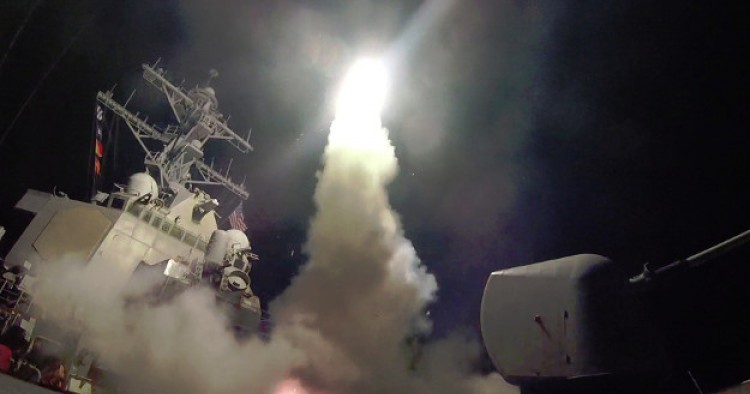Iranian officials condemned the Trump administration’s missile strikes against a Syrian airfield used for an alleged chemical attack against civilians. “We strongly condemn any unilateral military action and missile attack against the Shayrat airbase in Syria by American warships. We believe that such measures under the pretext of suspicious chemical attack in Khan Sheikhoun in Idlib… will empower failing terrorists and complicate the situation in Syria and the region,” said Iranian Foreign Ministry Spokesman Bahram Ghassemi earlier today. Foreign Minister Javad Zarif took to Twitter and accused the U.S. military of “fighting on same side as al-Qaida & ISIS in Yemen & Syria.” President Hassan Rouhani also tweeted about the incident: “US aggression against Shayrat strengthens regional extremism and terror, and global lawlessness and instability, and must be condemned.”
The U.S. strike also triggered warnings from senior Iranian lawmakers. “Russia and Iran will certainly not remain silent to military attack on Syria,” warned Alaeddin Boroujerdi, the chairman of Iranian Parliament's Committee on National Security and Foreign Policy. He claimed that the regime of Bashar al-Assad neither possessed chemical weapons nor had a reason to use them because it was winning on the battlefield. He added that the U.S. and its allies in Europe and the Middle East used the incident as an excuse to mask their “defeat” in Syria and take the Syrian issue to the U.N. Security Council. “This unwise action by America will undoubtedly have serious consequences,” he warned. Abolfazel Hassan Beki, the committee’s deputy head, went a step further and accused Washington of providing the Islamic State with chemical weapons to use in Syria in order to justify American intervention in the Arab country. But he claimed that an attack in Syria does not mean America will dare to target Iran. Several other top Iranian lawmakers issued similar threats.
Comment: The angry remarks by Iranian leaders came after the U.S. military launched more than 50 cruise missiles at the Syrian military airfield in the first direct American attack on the Assad government since the Syrian war began six years ago. The assault was in retaliation for a chemical attack that killed dozens of civilians this week. In the past years, Iran has not only deployed its elite Islamic Revolution Guards Corps (I.R.G.C.) personnel to help the Assad forces but has also recruited, funded and trained tens of thousands of Iraqi, Lebanese, Afghan and Pakistani Shiites to defend Iran’s ally in Damascus. About half a million Syrians have died in the war while millions have become refugees in neighboring countries and Europe.
So far, the reaction from Tehran has been measured and calculated. Supreme Leader Ali Khamenei, who has the final say in all state matters, has not commented on the U.S. strikes. There was no anti-U.S. outburst by Friday prayer leaders across the country either. The chiefs of Iran’s powerful I.R.G.C. and Quds Force have also been silent. While the Rouhani government strongly condemned the attack, it did not announce any specific retaliatory actions against the United States and its interests in the region. Nor did the Iranian government mention that the U.S. military strikes in Syria could impact the nuclear agreement Iran signed with the United States and five other world powers almost two years ago.
The Islamic Republic does not have the military capability to conventionally retaliate against the United States in Syria or in the broader region. But Tehran has recently sent Washington veiled threats through its proxies in Iraq and Afghanistan.
The Middle East Institute (MEI) is an independent, non-partisan, non-for-profit, educational organization. It does not engage in advocacy and its scholars’ opinions are their own. MEI welcomes financial donations, but retains sole editorial control over its work and its publications reflect only the authors’ views. For a listing of MEI donors, please click here.













